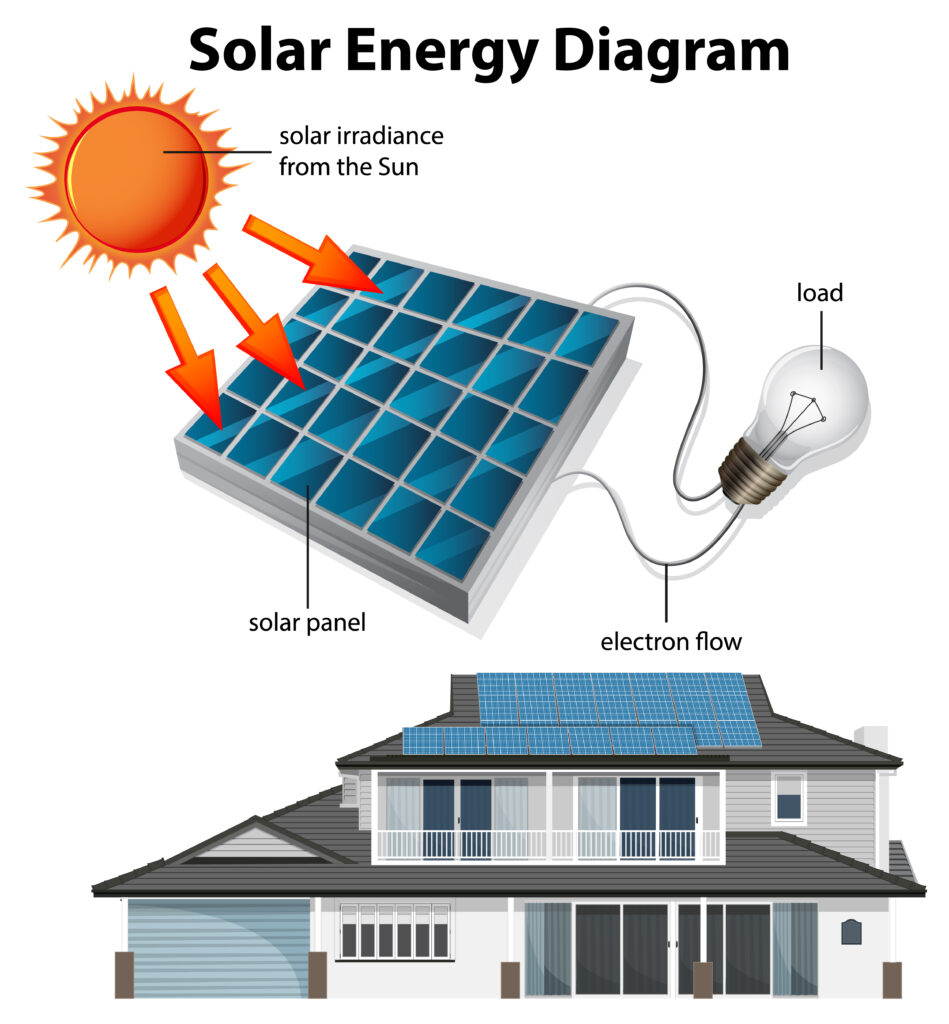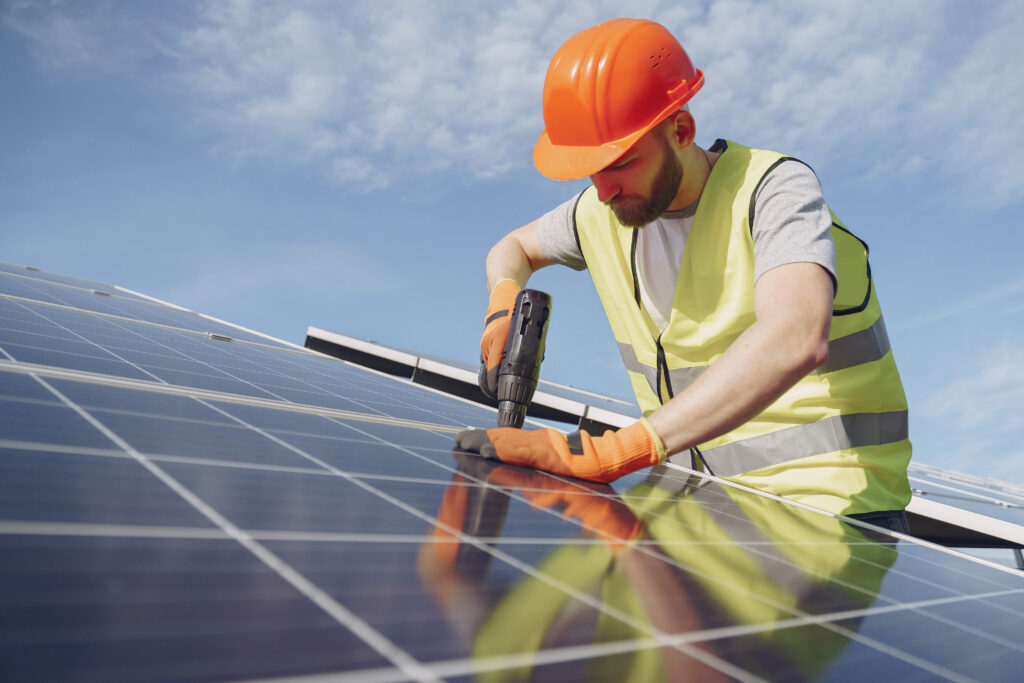Welcome to our comprehensive guide on solar panels! In this post, we aim to provide you with all the information you need to understand and make informed decisions about solar panels. Whether you’re considering going solar or simply want to expand your knowledge on the topic, this guide has got you covered.
What are Solar Panels
Solar panels, also known as photovoltaic (PV) panels, are devices that convert sunlight into electricity. They consist of multiple solar cells, which are made of semiconductors such as silicon. When sunlight strikes these cells, it generates an electric current through the photovoltaic effect. This direct current is then converted into alternating current (AC) using an inverter, making it suitable for powering homes and businesses.
There are various types of solar panels available in the market, including monocrystalline, polycrystalline, and thin-film panels. Monocrystalline panels are made from a single crystal structure, offering higher efficiency and a sleek appearance. Polycrystalline panels, on the other hand, are made from multiple silicon fragments, making them less efficient but more affordable. Thin-film panels are flexible and lightweight, but they have lower efficiency compared to crystalline panels.

Designed by Freepix
Advantages of Solar Panels
Solar panels offer numerous benefits, both for the environment and your finances. Let’s explore some of the key advantages:
- Environmental benefits: Solar energy is a clean, renewable source, which means it produces no greenhouse gas emissions or air pollution. By reducing your reliance on fossil fuels, solar panels contribute to combating climate change and preserving the planet for future generations.
- Financial benefits: Investing in solar panels can lead to significant long-term savings on your electricity bills. As sunlight is free, solar energy helps you reduce or even eliminate your reliance on grid electricity. Additionally, many regions offer incentives and rebates that further lower the upfront costs of installing solar panels.
Energy independence: By generating your own electricity, you gain independence from utility companies and the rising costs of electricity. Solar panels allow you to produce clean energy on-site and reduce your vulnerability to power outages or energy price fluctuations.
Installation Process
Installing solar panels requires careful planning and professional expertise. Here are the key steps involved in the installation process:
- Site assessment: A solar panel installer will evaluate your property’s solar potential, considering factors such as roof orientation, shading, and structural integrity. This assessment helps determine the optimal placement and sizing of solar panels.
- Designing the system: Based on the site assessment, a customized solar system design is created to meet your specific energy needs. This includes determining the number of panels, inverter capacity, and other components required for the installation.
- Permits and regulations: Before installing solar panels, you may need to obtain permits and comply with local regulations. This ensures that the installation meets safety standards and grid connection requirements.
Choosing a solar panel installer: It’s important to select a reputable and experienced solar panel installer for a successful installation. Consider factors such as certifications, customer reviews, and warranties when making your decision.
Sizing and Placement
Proper sizing and placement of solar panels are crucial for maximizing their efficiency and energy production. Here’s what you should consider:
- Determining energy needs: Evaluate your household’s energy consumption to determine the right size of the solar system. Factors such as electricity usage, peak demand, and future energy needs should be taken into account.
- Optimal placement for maximum efficiency: Solar panels should ideally be installed in a location that receives maximum sunlight throughout the day. Factors such as roof orientation, tilt angle, and shading from trees or nearby buildings can affect their performance.
Factors to consider when sizing solar panels: Besides energy needs, factors such as panel efficiency, climate conditions, and available roof space should be considered when determining the number and wattage of solar panels required.

Designed by Freepik
Maintenance and Care
To ensure the optimal performance and longevity of your solar panels, regular maintenance and care are essential. Here are some practical tips:
- Regular cleaning: Keep your solar panels clean and free from dirt, leaves, or bird droppings. Regularly inspect and gently wash them with water to remove any accumulated debris that may hinder their efficiency.
- Monitoring energy production: Use monitoring tools to track the energy production of your solar system. This helps identify any issues or underperforming panels, allowing you to take corrective action promptly.
- Inspecting for damage or issues: Periodically check for any signs of wear, damage, or loose connections. If you notice any issues, contact a professional solar panel technician to assess and resolve them.
Government Incentives and Rebates
Installing solar panels often comes with various government incentives and financial options to make it more affordable. Here are some incentives you may be eligible for:
- Federal incentives: The federal government offers a federal solar investment tax credit (ITC), allowing you to deduct a portion of your solar installation costs from your federal taxes.
- State and local incentives: Many states and local governments offer additional incentives, such as cash rebates, grants, or property tax exemptions, to encourage solar panel installations.
Rebates and tax credits: In addition to federal and state incentives, check with your utility company for any rebates or special programs they may offer to customers who install solar panels.

Designed by Freepix
Common FAQs
Let’s address some frequently asked questions about solar panels:
- Are solar panels worth it? Yes, solar panels are a worthwhile investment. They help you save money on electricity bills, reduce your carbon footprint, and increase the value of your property.
- How long do solar panels last? Solar panels are built to last for several decades. Most manufacturers offer warranties ranging from 20 to 25 years, and panels can continue generating electricity even after the warranty period.
- What happens during a power outage? Solar panels alone cannot power your home during a power outage. However, with the addition of a battery storage system, you can store excess energy produced during the day and use it to power essential appliances during outages.
- Can I sell excess energy back to the grid? Depending on your location and local regulations, you may be able to sell excess energy back to the grid through a process called net metering. This allows you to earn credits or receive compensation for the surplus electricity you generate.